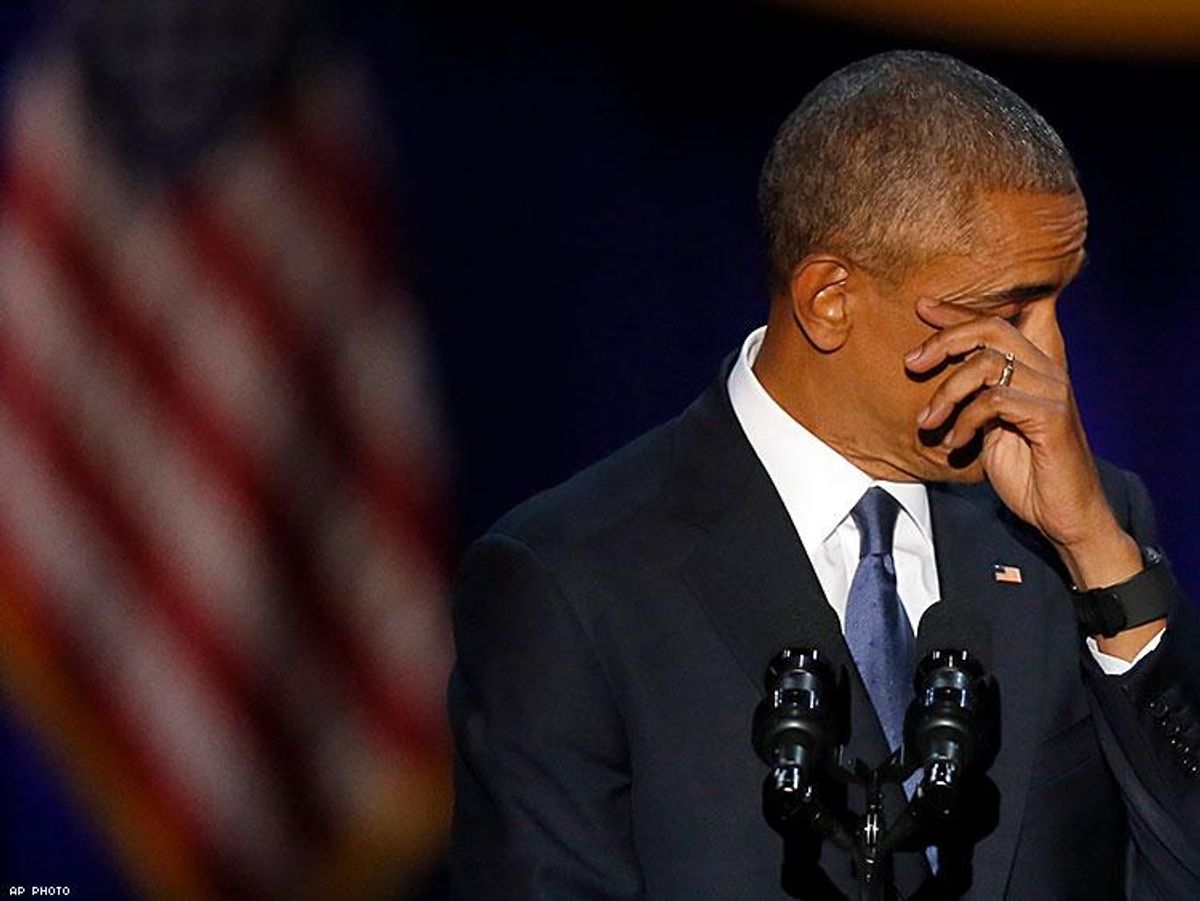Politicians
In Defense of a President's Tears

Barack Obama cried at his farewell address and throughout his presidency. It is a sign of his greatness, not his weakness.
January 11 2017 12:41 PM EST
January 11 2017 12:41 PM EST
dnlreynolds
By continuing to use our site, you agree to our Private Policy and Terms of Use.

Barack Obama cried at his farewell address and throughout his presidency. It is a sign of his greatness, not his weakness.
When Barack Obama cries, it matters.
Throughout his presidency, the Democratic politician has not been afraid to shed tears in public. He cried for his late grandmother in 2008, for the death of his vice president's son Beau, and for the victims of gun violence after the mass shooting at Sandy Hook Elementary School in Newtown, Conn.
One could track the tragedies of America's last decade through its president's tears. But grief isn't the only emotion able to move Obama. Hope and beauty also have their sway. Aretha Franklin made him misty-eyed with her music at the 2015 Kennedy Center Honors. Obama wept on the campaign trail as well, becoming emotional before Election Day in 2012.
Last night, he cried again toward the conclusion of his farewell address -- his final tears as president -- while he thanked First Lady Michelle Obama for her service and dedication.
"You took on a role you didn't ask for and made it your own with grace and grit and style and good humor," he said, raising a handkerchief to dry his eyes. "You made the White House a place that belongs to everybody. And a new generation sets its sights higher because it has you as a role model. You've made me proud. You've made the country proud."
The image of Obama wiping his tears was picked up by several prominent news outlets, including CNN, Fox News, and The Advocate, which chose it as lead art to represent the emotional impact of the address. It reflected what many viewers were feeling: pride in the accomplishments of Obama and the first family, coupled with the sadness of his farewell. Throughout the speech, the camera captured many supporters shedding tears, including Obama's daughter Malia.
As Americans prepare for a new president, it is important to recognize how Obama's tears -- last night and throughout his tenure as commander in chief -- have affected American culture. They broadcast that it is OK for men to cry, to grieve, and to love openly within a society that often instructs its men in the opposite lesson. Vogue also picked up on this significance in a Wednesday piece, "Why President Obama's Tears Matter."
"It's hard to quantify the message this sent, particularly to men and boys around the country who are socialized from a young age to keep a stiff upper lip and shake off their sorrows, that the most powerful man in the world would be vulnerable enough to cry in front of everyone; that he didn't buy into the belief that being stoic makes you strong; that there is actually power in his tears," wrote Michelle Ruiz.
"Only a secure and confident man can stand up while the world watches and tearfully thank his wife for her friendship, love, support, and independent achievements the way Obama did last night."
Because of this, Obama's tears may give his supporters another reason to grieve. They are likely the last presidential tears they will see in years. President-elect Donald Trump does not cry -- in public at least -- and dismissed the act in an interview with the Christian Broadcasting Network.
"I like to get things done. I'm not a big crier," he said. "I'm not someone who goes around crying a lot. But I know people like that. I know plenty of people that cry. They're very good people. But I have not been a big crier."
Indeed, conservative critics have attacked Obama's tears as a sign of weakness. Headlines like "Obama's America: Crybaby President Wipes Tears During Gun Control Speech" reflect the toxic masculinity that still pervades society. Who would not be made emotional by the death of children and seek out ways to prevent it from happening again?
Tears are a sign of strength, not weakness. They are also an honest reaction to joy and sorrow -- a window into a mind and soul. This week, Kellyanne Conway, Trump's campaign manager, made headlines for urging reporters to see beyond Trump's words and deeds and "look at what's in his heart." The statement is absurd. The press should never ignore the actions of a president-elect; and even if they did, what would they see? They should trust tears over Twitter any day of the week.